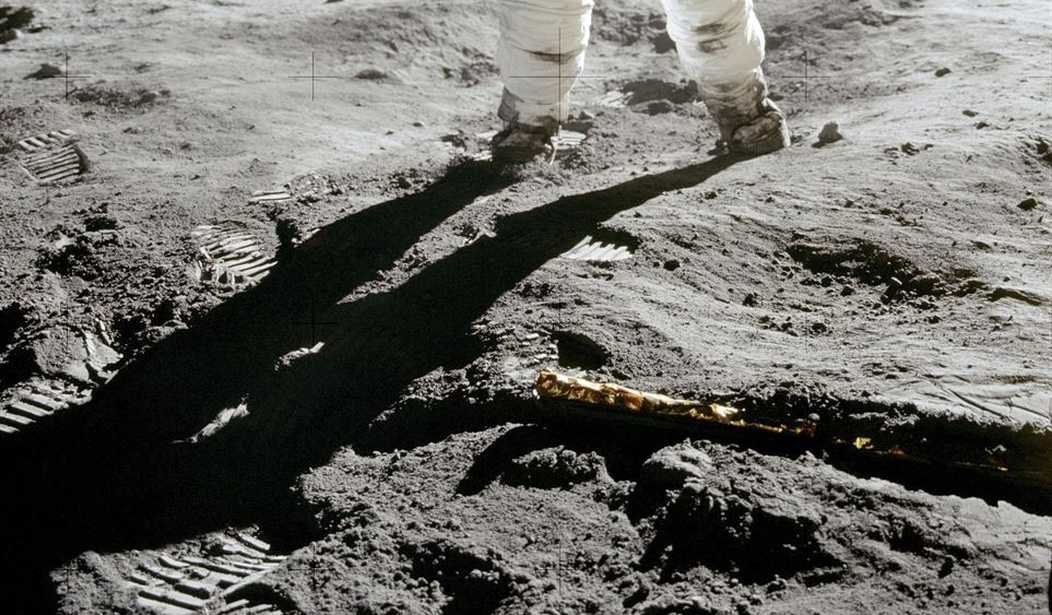I know the news cycle has moved on to fresher outrages, but I'd live to revisit last week's culture war freak out, because I think the wrong people freaked out.
A quick recap: The film "First Man" debuted at the Venice Film Festival. The movie chronicles the life of Neil Armstrong, the first human to land on the moon. A social-media-fueled firestorm ensued when it was revealed that the movie doesn't show the moment where the American astronauts planted the U.S. flag in what, I hope, will one day be considered American soil on the lunar surface.
Ryan Gosling, who plays Armstrong, told reporters that filmmakers decided to keep that moment out of the film because the moon landing "transcended countries and borders" and was "widely regarded in the end as a human achievement (and) that's how we chose to view it."
Conservatives had a field day, and understandably so. The idea that America went to the moon, at the height of the Cold War, in a "space race" against the Soviet Union primarily as part of a global vision of universal human solidarity is silly.
But in fairness to the filmmakers, the idea that this wasn't a giant leap for all mankind -- as Armstrong famously said and as the plaque on the moon declares -- is silly, too. Landing on the moon was widely regarded as a human achievement around the world. But that shouldn't detract from the national pride Americans feel for it. It should complement it.
And while I side with my conservative friends that this all sounds way too kumbaya and ahistorical -- Armstrong was a great American patriot and decorated Naval aviator -- what I think everyone is missing is the dog that didn't bark. Specifically, liberals should be aghast.
Recommended
I spend a lot of time arguing that conservatives should not imbibe too deeply from the bottle of nationalism. But it should be noted that one of the reasons many conservatives have decided to get drunk on nationalism, is that so many liberals have cut patriotism from their diets.
Pride in American accomplishments should not be a partisan affair. And yet, from flag pins to the pledge of allegiance, so many of our dumbest and nastiest political fights over the last few decades have been over purely symbolic fights over national pride.
But just because these fights are symbolic doesn't mean more practical politics aren't affected. Just ask Barack Obama. When he was president, Obama routinely appealed to precisely the patriotic fervor that made the moon landing possible.
For instance, in 2010, Obama gave a speech at Forsyth Technic Community College in North Carolina. It was one of countless calls for a new "Sputnik moment." "In 1957, just before this college opened, the Soviet Union beat us into space by launching a satellite known as Sputnik," he explained. "And that was a wake-up call that caused the United States to boost our investment in innovation and education -- particularly in math and science. And as a result, once we put our minds to it, once we got focused, once we got unified, not only did we surpass the Soviets, we developed new American technologies, industries and jobs."
"So 50 years later," he continued, "our generation's Sputnik moment is back. This is our moment."
He went on to push an agenda I didn't agree with, but that's beside the point. Liberals have long been enthralled by the accomplishments of liberal presidents that yoked patriotism to their agenda. Woodrow Wilson, FDR and JFK were all nationalists. Bill Clinton, John Kerry, Gary Hart and countless other Democrats became politicians largely because they were inspired by John Kennedy's call: "And so, my fellow Americans: ask not what your country can do for you -- ask what you can do for your country."
Kennedy did not say, "And so my fellow humans."
I generally despise arguments that begin, "If we can put a man on the moon..." we can do X, for too many reasons to detail here. But if you like such arguments, you need to pay a bit more respect to the "we" in that sentence.
Liberals have many lofty ambitions for what government can do (most of which I oppose). None of them are possible without inspiring the American people. And such inspiration is impossible without being at least little inspired by America itself.

























Join the conversation as a VIP Member